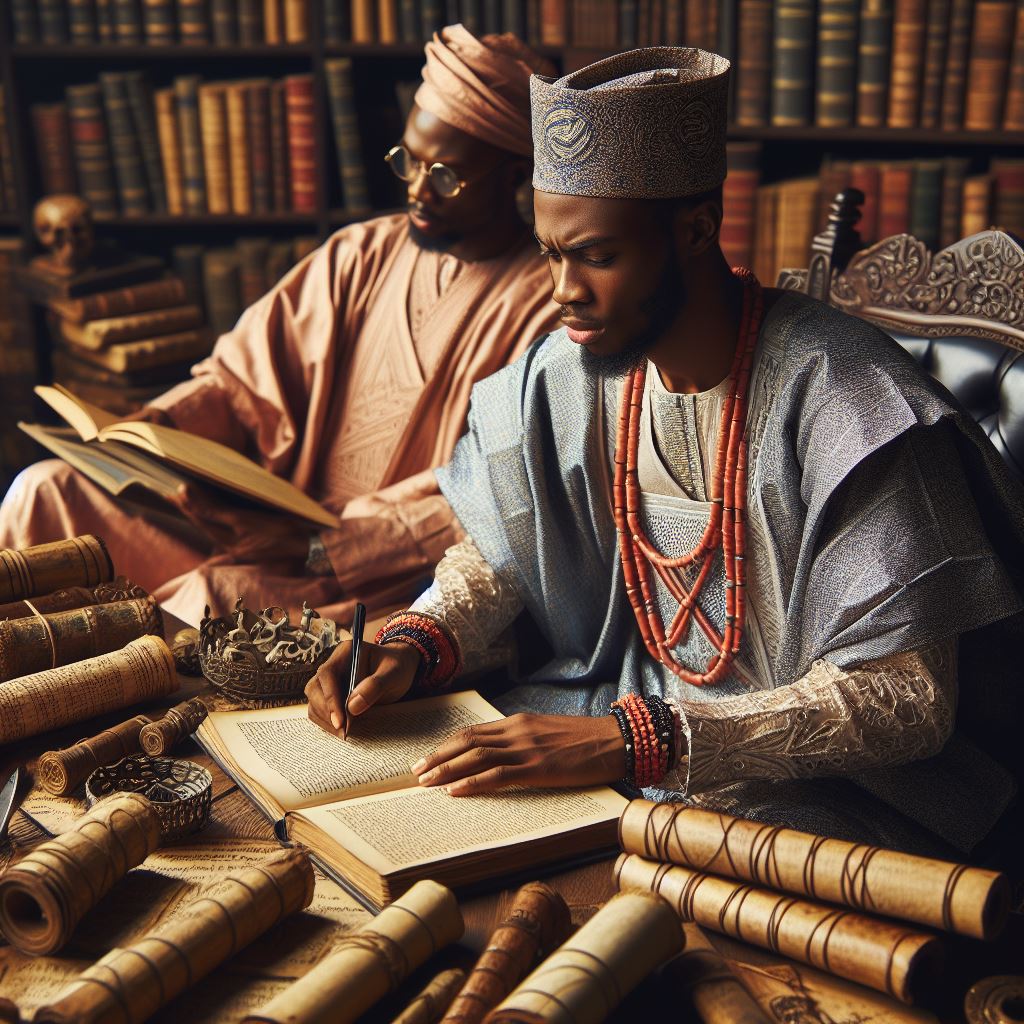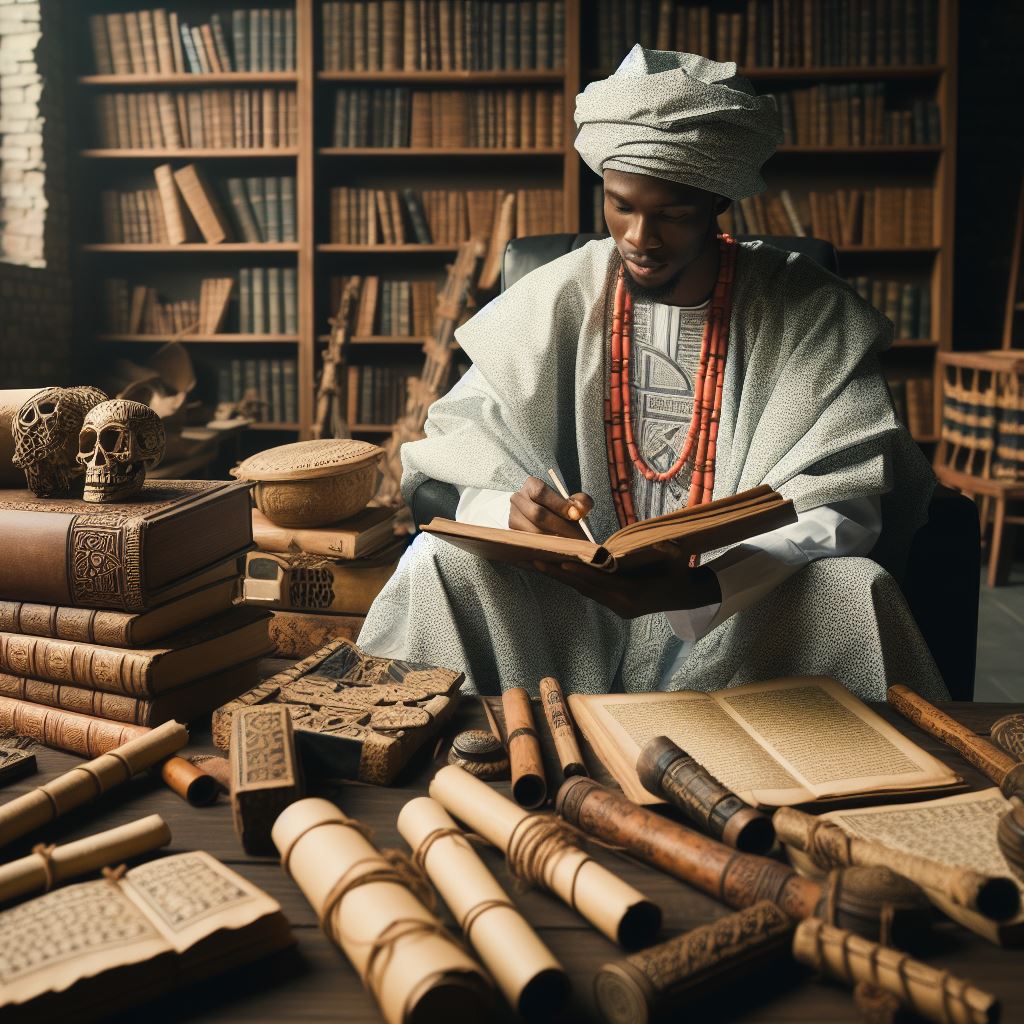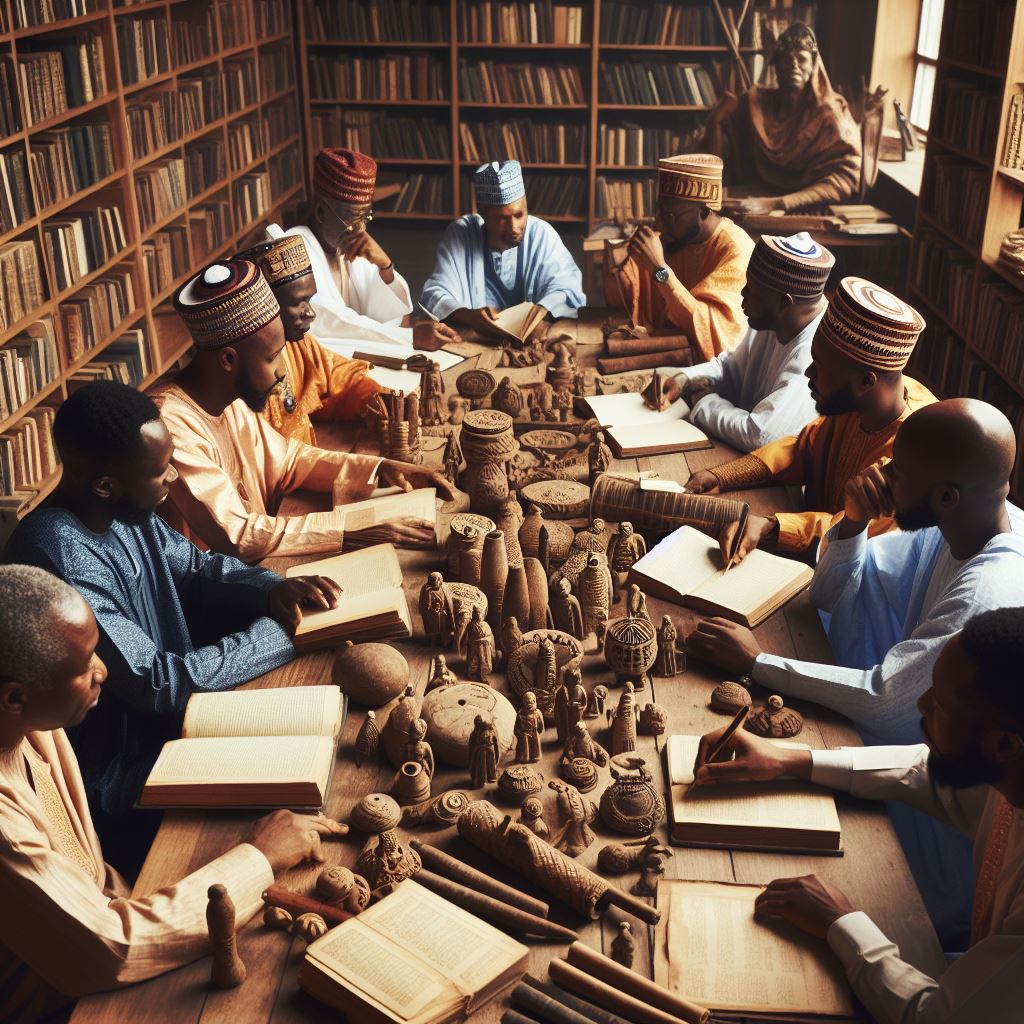Introduction
Anthropology studies in Nigeria encompass a multifaceted exploration of the nation’s rich cultural heritage, social dynamics, and historical evolution.
Delving into the depths of anthropology unveils a profound understanding of the diverse communities, traditions, and identities that shape Nigeria’s tapestry.
Understanding anthropology is not merely an academic pursuit but a vital endeavor for comprehending the complexities of Nigerian society.
It provides invaluable insights into the historical legacies, cultural practices, and social structures that define the Nigerian experience.
By studying anthropology, we gain a deeper appreciation for the nuances of Nigerian identity, fostering empathy, cross-cultural understanding, and social cohesion.
As we embark on this journey through the annals of anthropology studies in Nigeria, let us unravel the layers of history, culture, and tradition that intertwine to form the rich fabric of Nigerian society.
Through our exploration, we aim to illuminate the significance of anthropology in Nigeria and its enduring relevance in shaping our collective understanding of the nation’s past, present, and future.
Early Anthropology Studies in Nigeria
Influence of Colonial Anthropology
Colonial anthropology in Nigeria often perpetuated Eurocentric perspectives, neglecting indigenous knowledge and cultures.
Focus on Indigenous Cultures and Languages
In recent decades, anthropology studies in Nigeria have shifted focus to celebrate indigenous cultures and languages.
Contributions of Early Nigerian Anthropologists
Pioneering Nigerian anthropologists like Mazi Ogbonnaya and Prof.
Bolaji Campbell laid foundations for indigenous anthropology.
During the colonial era, anthropology in Nigeria primarily served colonial interests, emphasizing the superiority of European cultures.
Indigenous cultures were often misrepresented or ignored, perpetuating harmful stereotypes and erasing valuable cultural knowledge.
However, in recent years, there has been a significant shift in anthropology studies towards embracing indigenous perspectives.
Nigerian anthropologists now prioritize the study of local cultures and languages, recognizing their richness and diversity.
This shift has led to a more inclusive and nuanced understanding of Nigerian society.
Early Nigerian anthropologists played a crucial role in this paradigm shift.
Mazi Ogbonnaya, for example, advocated for the preservation and promotion of Igbo culture and traditions.
Prof. Bolaji Campbell focused on Yoruba culture and language, highlighting their importance in shaping Nigerian identity.
These pioneering anthropologists laid the groundwork for a more inclusive and culturally sensitive approach to anthropology in Nigeria.
Their contributions paved the way for a deeper understanding and appreciation of Nigeria’s rich cultural heritage.
Most importantly, the history of anthropology studies in Nigeria reflects a journey of evolution and transformation.
From the colonial era’s Eurocentric perspectives to the contemporary celebration of indigenous cultures, Nigerian anthropology has undergone significant changes.
The contributions of early Nigerian anthropologists continue to inspire and inform current research, fostering a more inclusive and culturally diverse approach to the study of Nigerian society.
Read: Introduction to African and Asian Studies in Nigeria
Development of anthropology departments in Nigerian universities
Anthropology as a discipline has a rich history in Nigeria, dating back to the early establishment of anthropology departments in Nigerian universities.
The development of anthropology as a field of study in Nigeria has been marked by significant milestones over the years.
Establishment of anthropology programs
The first anthropology department in Nigeria was established in the mid-20th century, laying the foundation for the growth of anthropology as an academic discipline in the country.
The establishment of anthropology programs in Nigerian universities provided students with the opportunity to study the diverse cultures and societies within Nigeria and beyond.
Growth of anthropology research and publications
With the establishment of anthropology departments, there has been a steady growth in anthropology research and publications in Nigeria.
Nigerian anthropologists have conducted research on various aspects of Nigerian culture, society, and history, contributing valuable insights to the field of anthropology globally.
Anthropology publications by Nigerian scholars have gained recognition both nationally and internationally, further elevating the profile of anthropology studies in Nigeria.
These publications have covered a wide range of topics, from traditional practices and belief systems to modern social issues, showcasing the diversity and complexity of Nigerian societies.
Collaborations with international anthropologists
In addition to local research and publications, Nigerian anthropologists have actively engaged in collaborations with international scholars in the field.
These collaborations have facilitated knowledge exchange, research partnerships, and joint publications, enhancing the global reach and impact of Nigerian anthropology studies.
Collaborative projects between Nigerian and international anthropologists have explored cross-cultural phenomena, comparative analyses, and interdisciplinary approaches to understanding human societies.
These collaborations have not only enriched anthropology studies in Nigeria but have also contributed to the advancement of anthropological knowledge worldwide.
In conclusion, the development of anthropology departments in Nigerian universities has played a crucial role in shaping the trajectory of anthropology studies in the country.
The establishment of anthropology programs, growth in research and publications, and collaborations with international anthropologists have all contributed to the vibrant and dynamic landscape of anthropology in Nigeria.
Read: Digital Media Trends in Communication Arts
Key Themes in Nigerian Anthropology Studies
Social structures and hierarchies
In the realm of Nigerian anthropology studies, one of the key themes that emerge is the focus on cultural heritage and preservation.
This theme is crucial in understanding the rich and diverse cultural tapestry of Nigeria, a country with over 250 ethnic groups.
Anthropologists in Nigeria delve deep into the customs, traditions, rituals, and belief systems of various ethnic groups to document and preserve their cultural heritage for future generations.
Identity politics and ethnicity
Identity politics and ethnicity also play a significant role in Nigerian anthropology studies.
Nigeria is known for its complex diversity, with various ethnic groups coexisting within its borders.
Anthropologists study how identity is constructed, negotiated, and performed within these diverse ethnic communities.
They examine the ways in which ethnicity shapes social interactions, political allegiances, and cultural practices in Nigerian society.
Cultural heritage and preservation
Social structures and hierarchies are another key theme in Nigerian anthropology studies.
Anthropologists explore the intricate social systems that govern relationships, power dynamics, and status within different Nigerian communities.
They analyze the role of kinship, gender, religion, and class in shaping social hierarchies and structures.
By studying social organization and stratification, anthropologists gain insights into the complexities of Nigerian society and its historical development.
Overall, Nigerian anthropology studies encompass a wide range of themes that reflect the country’s diverse cultural landscape, complex social dynamics, and rich historical heritage.
By examining cultural heritage, identity politics, and social structures, anthropologists contribute to a deeper understanding of Nigeria’s past, present, and future.
Their research not only sheds light on the unique experiences of Nigerian communities but also highlights the interconnectedness of global anthropological discourses.
Read: Impact of Communication Arts on Nigerian Media

Uncover the Details: Importance of Music Education in Nigeria
Challenges faced by anthropologists in Nigeria
Anthropology studies in Nigeria have faced numerous challenges that have impacted the research and growth of the discipline in the country.
These challenges have hindered the progress of anthropologists and affected their ability to conduct quality research.
Understanding these challenges is essential for addressing them effectively and improving the state of anthropology studies in Nigeria.
Lack of Funding for Research
One of the primary challenges faced by anthropologists in Nigeria is the lack of adequate funding for research.
Without sufficient financial support, anthropologists struggle to conduct fieldwork, analyze data, and disseminate their findings.
This lack of funding limits the scope and quality of research that can be undertaken in the country.
Limited Access to Resources and Data
Another significant challenge for anthropologists in Nigeria is limited access to resources and data.
Many research institutions in the country lack the necessary facilities, technology, and materials needed to conduct comprehensive studies.
This lack of access hampers the ability of anthropologists to collect and analyze data effectively.
Ethical Considerations in Studying Diverse Cultures
Anthropologists in Nigeria also face ethical considerations when studying diverse cultures.
It is essential to approach research with sensitivity and respect for the communities being studied.
Ensuring that research is conducted ethically and responsibly is crucial for maintaining trust and collaboration with local communities.
In conclusion, the challenges faced by anthropologists in Nigeria, including lack of funding, limited access to resources, and ethical considerations, have significantly impacted the development of anthropology studies in the country.
Addressing these challenges requires a concerted effort from policymakers, institutions, and researchers to support and promote the growth of anthropology in Nigeria.
Read: Internship Opportunities for Communication Arts Students
Explore Further: How to Create High-Quality Films on a Budget in Nigeria
Delve into the Subject: Nigerian Economic Policies and Their Impact
Impact of anthropology studies on Nigerian society
Shaping policies and development programs
Anthropology studies in Nigeria have played a crucial role in shaping policies and development programs.
By conducting ethnographic research and studying the cultural practices of different Nigerian communities, anthropologists provide valuable insights that are used to inform government policies and programs.
For example, anthropologists have helped policymakers understand the traditional systems of governance in different ethnic groups, leading to the development of more inclusive and culturally sensitive policies that reflect the needs and values of the Nigerian people.
Promoting cultural diversity and tolerance
Anthropology studies have also been instrumental in promoting cultural diversity and tolerance in Nigerian society.
By studying and documenting the unique traditions, languages, and customs of different ethnic groups, anthropologists help raise awareness about the importance of respecting and celebrating cultural differences.
This, in turn, fosters a more inclusive and harmonious society where individuals from diverse backgrounds can coexist peacefully and learn from each other.
Anthropology studies have also been instrumental in promoting cultural diversity and tolerance in Nigerian society.
By studying and documenting the unique traditions, languages, and customs of different ethnic groups, anthropologists help raise awareness about the importance of respecting and celebrating cultural differences.
This fosters a more inclusive and harmonious society where diverse individuals can coexist peacefully and learn from each other.
Preserving traditional knowledge and practices
Another significant impact of anthropology studies in Nigeria is the preservation of traditional knowledge and practices.
Anthropologists document and safeguard indigenous knowledge, cultural rituals, and traditional healing practices threatened by modernization and globalization.
Anthropology studies preserve valuable aspects of Nigerian heritage. This preservation contributes to cultural identity and continuity across generations.
Conclusion
In summary, the history of anthropology studies in Nigeria is a narrative of evolution and transformation.
From its colonial origins to its contemporary focus on indigenous cultures and languages, Nigerian anthropology has undergone significant changes.
Throughout its journey, anthropology has played a pivotal role in uncovering the diverse cultural heritage of Nigeria.
It has shed light on the complexities of Nigerian society, celebrating the richness of its traditions and languages while challenging colonial biases.
As we reflect on this journey, it is imperative to recognize the ongoing importance of anthropology in Nigeria.
Continued support and recognition of anthropological research are essential for preserving Nigeria’s cultural heritage and fostering cross-cultural understanding.
Therefore, I urge stakeholders, policymakers, and the public to continue supporting and acknowledging the significance of anthropological research in Nigeria.
By doing so, we can ensure that Nigeria’s diverse cultural landscape is celebrated, preserved, and understood for generations to come.




